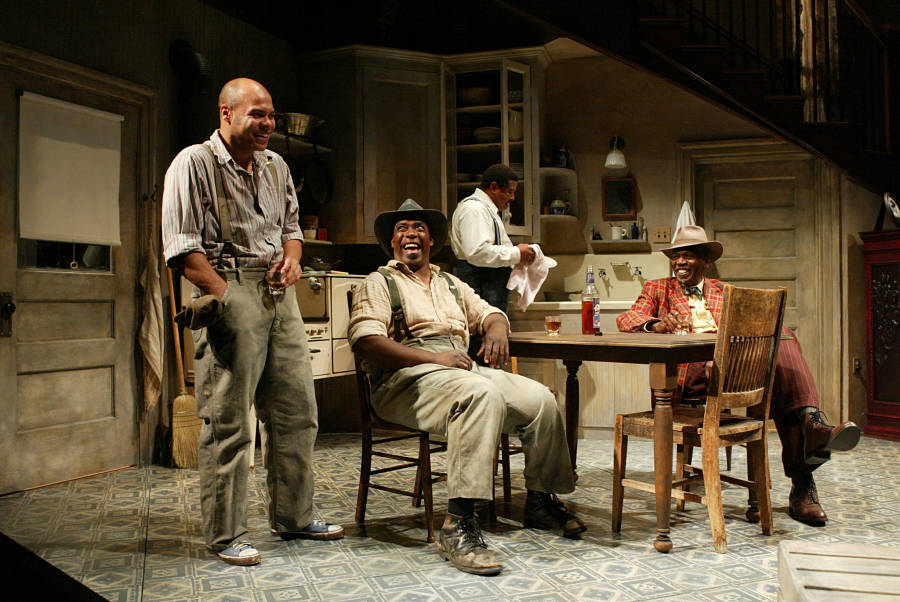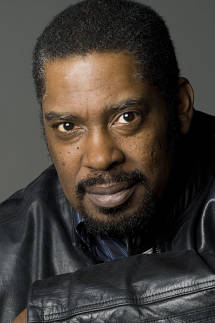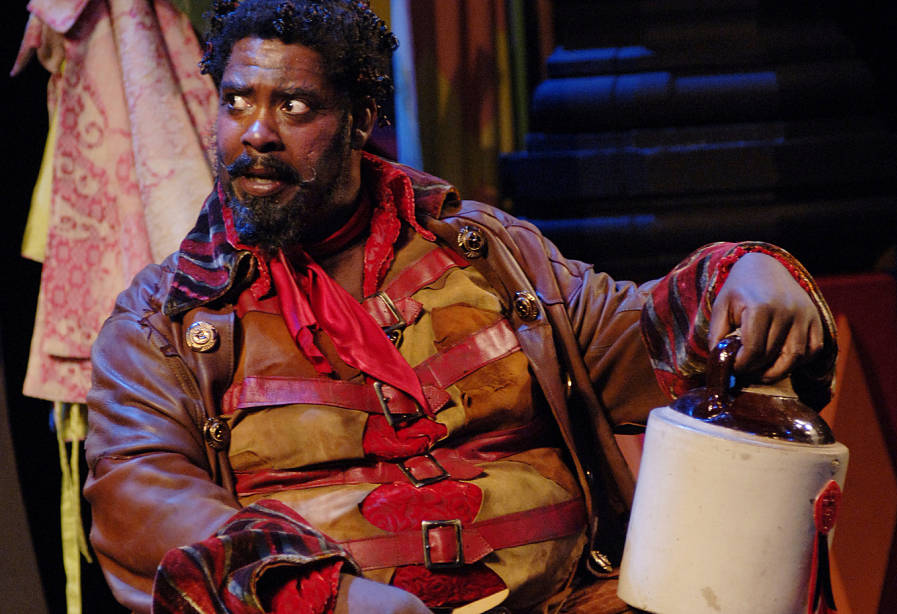G. Valmont Thomas, a Seattle-based actor who spent many seasons at Oregon Shakespeare Festival, died on Monday, Dec. 18, of bone cancer. He was 58.
With his larger-than-life personality, G. Valmont Thomas filled up any room or stage “to bursting.” He had a huge heart and a deep belly laugh that was unforgettable, and was one of the greatest huggers of all time. My longtime friend and collaborator was by far the most versatile, prolific, and multi-talented theatre artists I have ever known.
I first met Gregg when I was associate artistic director of the Group Theatre in Seattle in the mid-’80s. I had heard about this black actor who was blowing the roof off the Empty Space Theatre in the role of Frank N. Furter in Rocky Horror Show. He and I started working together when I directed him in the West Coast premiere of The Colored Museum. For the next 10 years in Seattle I don’t think he was ever not in a rehearsal or in a performance. He played in Shakespeare and classical productions at the Seattle Rep and the Bathhouse Theatre, contemporary plays at the Empty Space, the Group, Pioneer Square, and at ACT. He was often cast in parts usually portrayed by white actors, as well as playing black characters. He crossed the color barrier time and again, transforming from role to role. In fact, he was dubbed the “hardest-working actor in Seattle”.
In 1998 Libby Appel asked Gregg to join the acting company at Oregon Shakespeare Festival. He would go on to act in dozens of shows in his 14 seasons with OSF, where I also served as associate artistic director for 12 seasons. We collaborated on many productions throughout the 32 years I knew Gregg. His performance as Boy Willie in The Piano Lesson at OSF was one for the ages. He came onstage with that huge grin he had, his eyes darting around the stage searching for that piano. As he fought for ownership of the piano with the powerful Crystal Fox, who played his sister Berniece, he roared with an urgency and intensity that aroused the ancestor spirits within and without. His epic battle with the Ghost of Sutter was seismic and undeniable. Ten years later he went on to play the older musician Wining Boy (who had demons of his own) in our second production of The Piano Lesson, this time at Syracuse Stage and Seattle Rep.

Wrestling with demons was not at all foreign to G. Val. As fun-loving and gregarious as he often was, he also had a very complicated emotional life that could turn quite dark and tormented. We spent many hours, as did many of his closest friends, having deep discussions on the meaning of life and the human condition. He had very high standards for himself and others around him, and was often disappointed by what he saw and felt. He could be a very harsh critic of society, institutions, and the artists he worked with, while always being his own hardest critic. This caused him much pain and sadness at times, even when everyone around him was showering him with genuine love and praise. He was in a constant battle to try to understand why things weren’t better and why people had made certain choices, yet he was also incredibly sensitive and tender. During a stint as a professor at the University of Nebraska, he was alternately inspired and frustrated by young students who, green as they were, did not have his high standards or years of experience.
As an actor, his unfiltered emotional life and fearless gaze into the flaws of all the characters he portrayed gave his performances tremendous depth and detail. G. Val had an uncanny ability to reveal the heart and passions of his characters with such startling clarity that you couldn’t take your eyes off of him when he was on a stage. He was an artist. He was equally comfortable and adept acting in contemporary, classical, musical, dramatic, or comic plays. He could sing, dance, and play the hell out of a guitar and harmonica. He even learned to play the oud for our production of Twelfth Night at OSF. He was an amazingly physical actor, was super expressive, and had mad language skills. His work with August Wilson’s poetry excelled due to his musical ear for the blues and jazz, his understanding of the meter of poetry and metaphor gleaned from dozens of Shakespeare roles, and his understanding of the complexities of being a black man in America.

In his final weeks I was astonished to find him the most “at peace” I had ever seen him. He was able to accept the love that was showered on him by so many. He still had axes to grind (who wouldn’t in these crazy times?), but he was able to find a way to let go. I was so profoundly grateful to see him shed his psychic pain and find peace. He is survived by three children: Aria Thomas, Langston Thomas, and Oliver Hansen.
In closing, I can’t help but remembering words from August Wilson’s Gem of the Ocean that G. Val spoke so poignantly as Solly Two Kings:
I been to the City of Bones. It’s something like you ain’t never seen. A whole city a half mile by a half mile made of bones. All kinds of bones. Leg bones. Arm bones. Head bones. It’s a beautiful city. That’s where I’m going when I die. I know where I’m going. Got Twelve Gates and it’s got Twelve Gatekeepers. That’s what I always wanted to be. A keeper of the Gate!
Tim Bond is a director, professor, and head of the professional acting training program at University of Washington.


